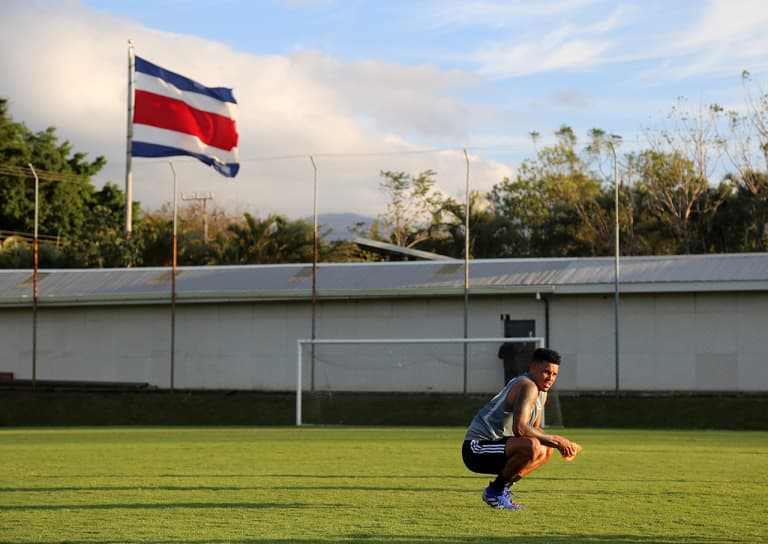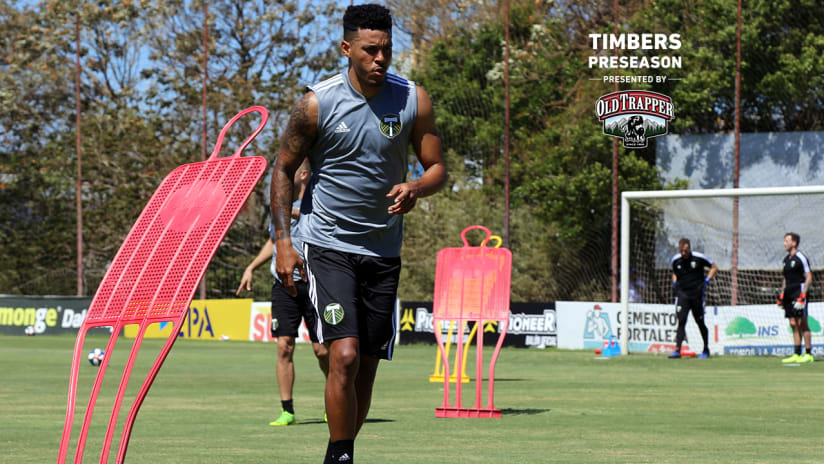SAN JOSÉ, Costa Rica – There are four former Deportivo Saprissa players in camp with the Portland Timbers this preseason, but for one of them, Monday’s friendly against a selection of Saprissa players must have felt slightly different. Perhaps that’s because neither David Guzmán nor Marvin Loría were on the field, while veteran defender Roy Miller spent only one season with the club.
Julio Cascante wasn’t with the club for much longer, joining the Costa Rican titans in 2016 after his time for CF Universidad de Costa Rica. But having moved to Portland just over a year ago, Cascante still has close ties within his former club, some of which were on the field at Costa Rica’s national team facility as the defender’s current and former teams faced off.
“It’s a little weird, playing with the Timbers against Saprissa,” Cascante admitted, speaking in his native Spanish, the day after his first 45 minutes of preseason. The second-year Timber started the first half and helped Portland keep a clean sheet in a 4-0, friendly victory.
“It was a beautiful thing, though,” he conceded. He and his ex-teammates, “are all still friends, like brothers, and we talked to each about how lucky we were to have the experience.”
The contrast between former and current Saprissa talents made it impossible to ignore how far Cascante has come. Three years ago, he was playing for UCR, a team that last claimed a Costa Rican title 76 years ago. Come 2016, Cascante was competing for time with his country’s biggest club, a status that proved to be a stepping stone to something even bigger. Logging 1729 minutes in his Major League Soccer debut, Cascante spent 2018 taking yet another step, starting 18 out of 34 regular-season games while helping his new team to the playoffs.
“Every day, only so much can happen, but together, those days made last year into a metric,” Cascante explains, philosophically, “a metric that reflected a tournament where I got a lot of time, and had a lot of days where the games were very rewarding.
By year's end, though, the conversation around Cascante had gone from the glimpse of his promise to questions about his place. The starts he’d been getting through the summer were, near the end of the season, going to another Timbers player competing for time in central defense: Bill Tuiloma. Whereas once Cascante was asserting his place on Giovanni Savarese’s depth chart, come the postseason, the Costa Rican was at another point in his battle.
“When things happen in soccer, they don’t feel the same as if similar things happened in life …,” he explains, a thoughtful approach to what, from the outside, strikes a more practical note.
“I also think that life with your teammates offers you many things. I’ve learned so much from (Diego) Valeri, and the same for Liam (Ridgwell) and Larrys (Mabiala). And Bill. I think it’s good, because we all have quality to offer, in various ways.”
Among all the mentors he’s found through one year in Portland, one stands out.
“One person who is really important to me, right now, is Diego Chara,” he says. “There’s so much to admire about him. There is an incredible way he goes about his job, the things that are important to him, life in general. I try to be like him, to follow him, when he lets me, because I think that’s how I’m going to get where I want to go.”
The focus on qualities that transcend the field, the soft skills of professional life, strike a positive note at a time when so many people outside the Timbers locker room are curious about internal competition. Portland’s depth chart is stronger than ever, people like myself keep saying, and the product of that design is bound to lead to a greater fight for spots. That could drive improvement, but instinctively, it could also drive contention, we think from afar.

Cascante has a different view. He may be the Timbers player affected most by the way the team has decided to use its resources, but he was never guaranteed playing time at Saprissa, either. The Costa Rican titans perpetually have to balance their international-quality regulars, stars returning from excursions abroad, and a youth pipeline as productive as any club in the region. Depth was always a reality in San José, too.
While from the outside, that kind of competition looks like a hinderance to a player like Cascante, it’s also something that helped get him to Portland, potentially explaining why, when it comes to crowded depth charts, he espouses a less defensive view.
“If you’re going to play in Europe, or play at a high level, you have to (deal with competition),” he says, offering a hypothetical to illustrate why a fight for minutes, no matter where a player of certain qualities is at, might be inevitable. “(A player) needs to copy the good things they see in others and be honest about the things they need to do as a player, and as a person.”
There’s no extraordinary concern from Cascante. In fact, he seems more at ease than he did a year ago. Back then, a player who was just becoming comfortable with his English was venturing to the United States, making his first professional excursion outside of Costa Rica. Now, standing underneath his home country’s sun, he recalls his first days in Portland, smiling as he remembers temperatures that put the city on the verge of snow.
“I really like Portland’s cold a lot,” he says, as we discuss the annual snow panic that’s ongoing back home. “The snow, it’s so beautiful.”
“We [Cascante and his family] knew the weather was going to be like that, occasionally, when I signed, but what I really loved about the city was there was so much to do, and I like the idea of a city that has so many new things you can find and do.
“But at the same time, there is a calm to Portland. That part of life, it really helps a player.”
It’s a change from Costa Rica, where Cascante enjoyed a different kind of calm. It was a calm of familiarity, as well as a lifestyle that lives “la pura vida” (pure life) in every moment. In Portland, though, the calm comes from being in a new place he enjoys, as well as, despite the competition, being on the right professional course.
“My view, right now, is not about the personal,” he explains. “I want to talk about the team, about how we need to stay calm but strong if we are going to get something more out of ourselves. That is without a doubt.”
It’s the subtext every Timbers player has, right now; the subtext demanded after finishing as the season’s league runners up. And if Portland is to improve on last season, its situations like his, and the positional battles they entail, that can propel them forward.
“There is a lot of intense competition between us, right now, because there are four or five central defenders in the squad. We’re all working to be starters, to be the most important players for the coming season, but we’re also supporting each other.
“That competition could get us where we need to be, come the end of the season.”












